About the Exhibition
Chronicles of the Chronic is a group exhibition that celebrates the creativity and resilience of the chronically ill community. It features regional, national and international artists whose practice reflects holistically upon the experience of living with a chronic health condition. Eight of the thirteen artists were invited by the Curator, and the remaining five were selected through a juried process from a pool of eighty-one applicants. The jury was composed of a diverse group of artists, curators and healthcare professionals, including Alison Berglom Johnson (artist, curator, educator and disability advocate), Keisha Williams (MCAD Gallery Director and Curator), Victor Montori M.D. (founder of Patient Revolution and author of Why We Revolt) and Zoe Cinel (Rochester Art Center Curator).
Featured artist: Anna Cowley Ford, Anna Hite, Benjamin Merritt, Brothers Sick (Ezra and Noah Benus), Drew Maude-Griffin, Geography of Illness (Emma Jones), Emma MacLean, Jennifer Bastian, Kym McDaniel, Lauryn Youden, May Ling Kopecky, Weng San Sit.
Curatorial Statement
“Wellness is an ongoing and unfinished project. I used to believe that sickness and wellness were diametrically opposed, but I understand now that they flow back and forth and within each other.”
Emma MacLean, Artist Statement for Pain Journal No.2, 2021
The idea for Chronicles of the Chronic originated in 2020 as the result of being unexpectedly thrown into the chaotic space of autoimmunity. [1] In the cauldron of navigating immigration and a pandemic as a newly chronically ill and dynamically disabled person, I witnessed personal and collective grief, and I felt the urge to be in conversation with others, find community, gain visibility and advocate. In our society, chronic illness and disability are regarded as private matters, as taboo, and when publicly represented they are often mediated by a scientific gaze. However, illness is an inevitable part of everyone's life, as is also disability in various forms. [2] Why do we shy away from talking about it?
I realized that representations of illness proposed in mainstream media and western art history are predominantly mocking, scrutinizing or pitying, and they are narrated through an external gaze. The first-hand perspectives of individuals who are ill and disabled are rarely centered: How does one’s gender, race, social class and immigration status play into the individual narrative? What are the barriers preventing individuals and the community from having full-rounded visibility? What about joy, resilience, creativity and wisdom? The Centers for Disease Control and Prevention defines chronic diseases “as conditions that last one year or more and require ongoing medical attention or limit activities of daily living or both.”[3] When a cure is medically considered impossible, where do we turn for remedy and inspiration? Perhaps it is within the unseen and untamed that the most creative path for healing and care blossoms.
I turned toward artists, authors and advocates that traced these uncharted paths for themselves and for others. Most are BIPOC, trans, queer, or immigrants who created revolutions from their bed through their written words, visual art and conversations. To honor those mentors and with the hope that visitors will find guidance, clarity and resonance, a list of inspirations is included at the end of this statement. Similarly, to overcome the idea that illness is confined to the invisible and lonely, it was important to make a space for rest and reflection within the gallery. In the Care Library, visitors can pause, ground themselves, and browse a multimedia selection of resources including books, podcasts, essays and more.
Chronicles of the Chronic presents twelve artworks created using a vast range of media, scales and technologies. This variety acknowledges that every experience of illness and disability is unique and rooted in intersectionality. These individual experiences also present aspects that are universal and relatable. The formal qualities of the works are driven by deliberate conceptual choices made by the artists. In most cases, they also embrace artists’ disabilities and show adaptive strategies, while exploring new paths for creativity and resilience. There are infinite interwoven threads, soft-spoken conversations, and variations within recurring themes. Three main questions drove the curatorial process: How to foster visibility through self-representation and advocacy? How to unfold and celebrate the complexity of care and healing? How to challenge a binary perception of illness versus wellness? Overall what ties all artworks and threads together is a deep and proud sense of belonging to a community that cares to strive for a more resilient and inclusive society. As you walk through this exhibition, reflect on what illness, disability, care and community mean to you. I hope you find resonance and belonging.
About Care as a Multitude
“The most anti-capitalist protest is to care for another and to care for yourself.”[4]
Johanna Hedva, Sick Woman Theory, 2020
The word curator is commonly used in the fields of museology, art and culture, but it originally derives from the Latin word ‘cura’, which means care. It has been used in various contexts including spirituality, as in the Medieval Latin curatus, meaning the "one responsible for the care (of souls)". It was also applied in the medical field to address "medical attention."[5] In a broader sense, to curate means ‘to take care’, ‘to manage’, ‘to cure’.
It is fascinating and serendipitous to witness how physical and spiritual worlds merge in this one word, especially as I am curating a show about care, in its multiforms. As artworks were selected and collaborators contributed to this project, the word “care” expanded to become a universe made of bright colors, deep darknesses and in-betweens. For printmaker and professional caregiver Benjamin Merritt, care is an ongoing investigation, and a quest for radical honesty. In the series of prints Care is, Merritt unfolds layers by using his original poetry. In the artist’s individual experience, care is simultaneously “messy,” “a rhinestone,” and “a blanket in Briar.'' Care also accounts for multitudes: it is an expression of “solidarity” and “interdependence”. In their Crip Futures, Drew Maude-Griffin carefully crochets the words CARE HOLDS US ALL // LIKE A BATH HOLDS BUBBLES, proposing new approaches to illness: an opportunity to build community, and a fertile ground for self-discovery.
Visibility and connection are the conceptual and physical frameworks that inspired the gallery’s layout. As you enter, you encounter artworks that portray the unspoken. Self Portrait - Multiple Sclerosis and My Body and the series Students with MS by May Ling Kopecky, the multimedia soft sculptures Fatigue by Anna Cowley Ford, Recovery Position by Anna Hite, and the video series Exit Strategies by choreographer and filmmaker Kym McDaniel take you on a journey through the demystification of invisible symptoms and the recognition of unnoticed aspects of being ill.
Placed in the center of the gallery, Jennifer Bastian’s large-scale quilt, I have missed you (Community Care is the Intimacy I Need), radiates with the joy of intention and solidarity. That joy is mirrored by offerings of vulnerability: the vulnerability of failure and imperfection embraced by artist Emma MacLean in her quilted Pain Journal No.2; the offering of survival and healing strategies against an ableist society portrayed in the photographs of Canadian poet and performer Lauryn Youden; the practice of holding space for others found in the participatory series Nightstand Collective, by Geography of Illness (Emma Jones), and Routine as a Repertoire by Singaporean artist Weng San Sit.
Chronicles of the Chronic is conceived as an act of care, a space for conversations. Author Victor Montori, M.D. writes in his book Why We Revolt: “Care is a fundamentally human act (...) the art of drawing people into a productive conversation.”[6] You are welcome to join the sometimes soft and nurturing, sometimes loud and uncomfortable, conversations that are happening in this space. Using the words of the collaborative duo Brothers Sick, I invite you to gently add your voice to the symphony, and join our “army of the sick.”
[1] Carolyn Lazard, “How to Be a Person in the Age of Autoimmunity.” Project Row Houses, 2022, accessed August 24, 2023, https://projectrowhouses.org/howtobeapersonintheageofautoimmunity/.
[2] I am referring here to all these everyday devices that implement the abilities of the human body: from reading glasses to a cane, from a hearing aid to orthopedics shoe pads.
[3] Centers for Disease Control and Prevention, "About Chronic Diseases," CDC, accessed August 24, 2023, https://www.cdc.gov/chronicdisease/about/index.htm.
[4] Johanna Hedva, "Sick Woman Theory," Kunstverein Hildesheim, accessed August 24, 2023, https://www.kunstverein-hildesheim.de/assets/bilder/caring-structures-ausstellung-digital/Johanna-Hedva/cb6ec5c75f/AUSSTELLUNG_1110_Hedva_SWT_e.pdf.
[5] as in the Latin word curationem, meaning "to take care, attention, management," "Curate," Etymology Online, accessed August 24, 2023, https://www.etymonline.com/word/curate#etymonline_v_472.
[6] Victor Montori. “Why We Revolt”, (Mayo Clinic Press, 2nd ed., 2020), 161.







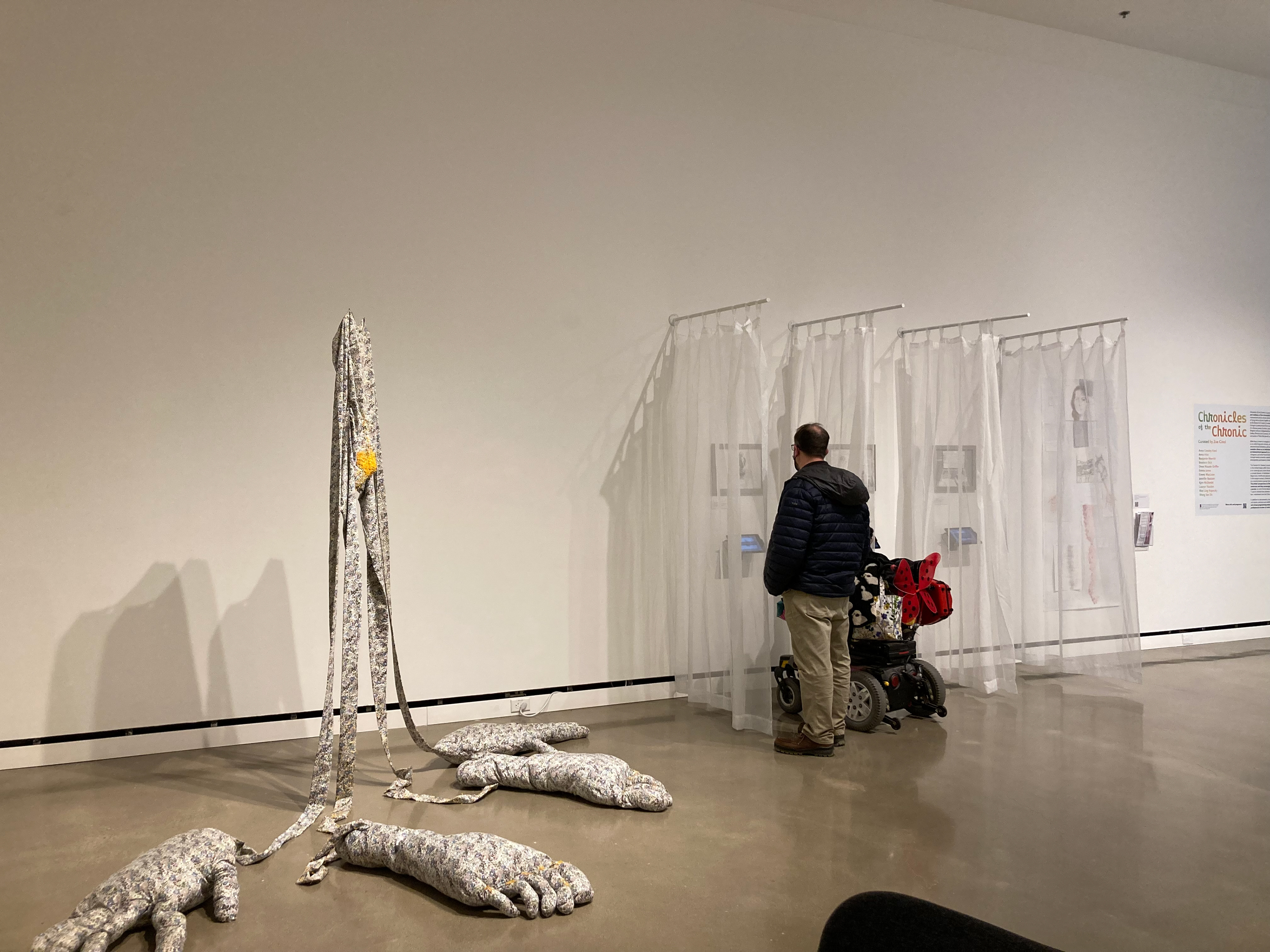







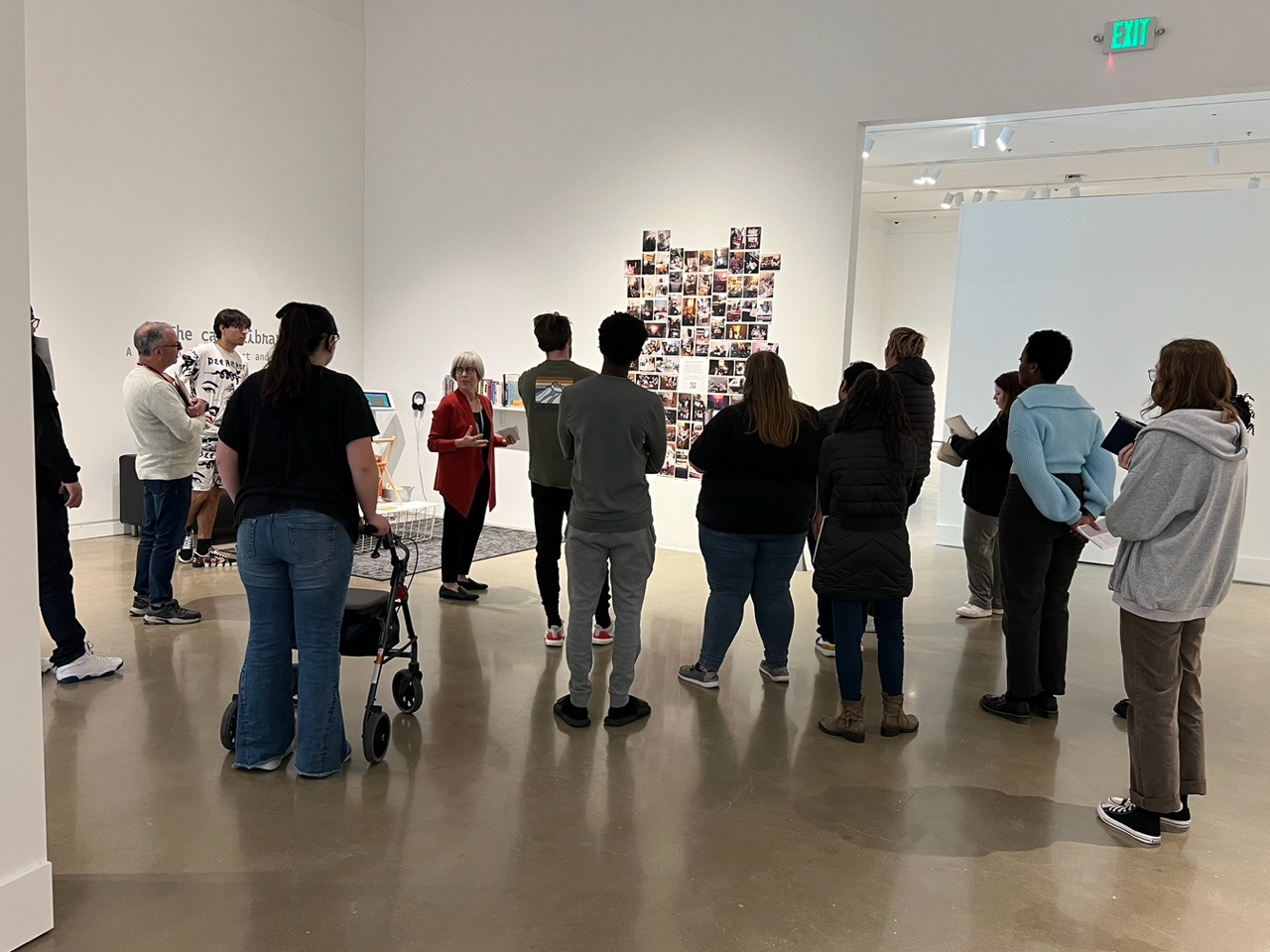




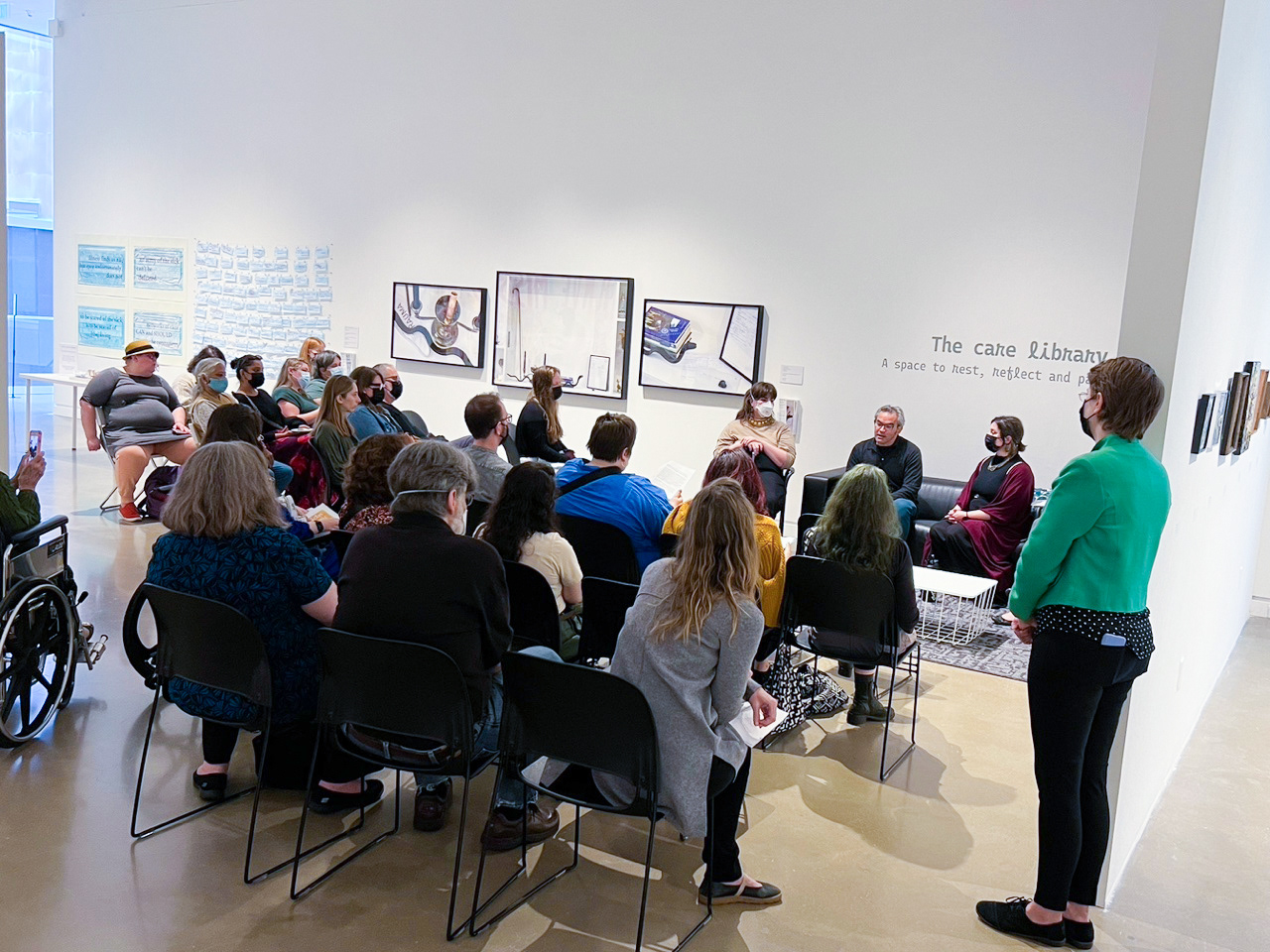



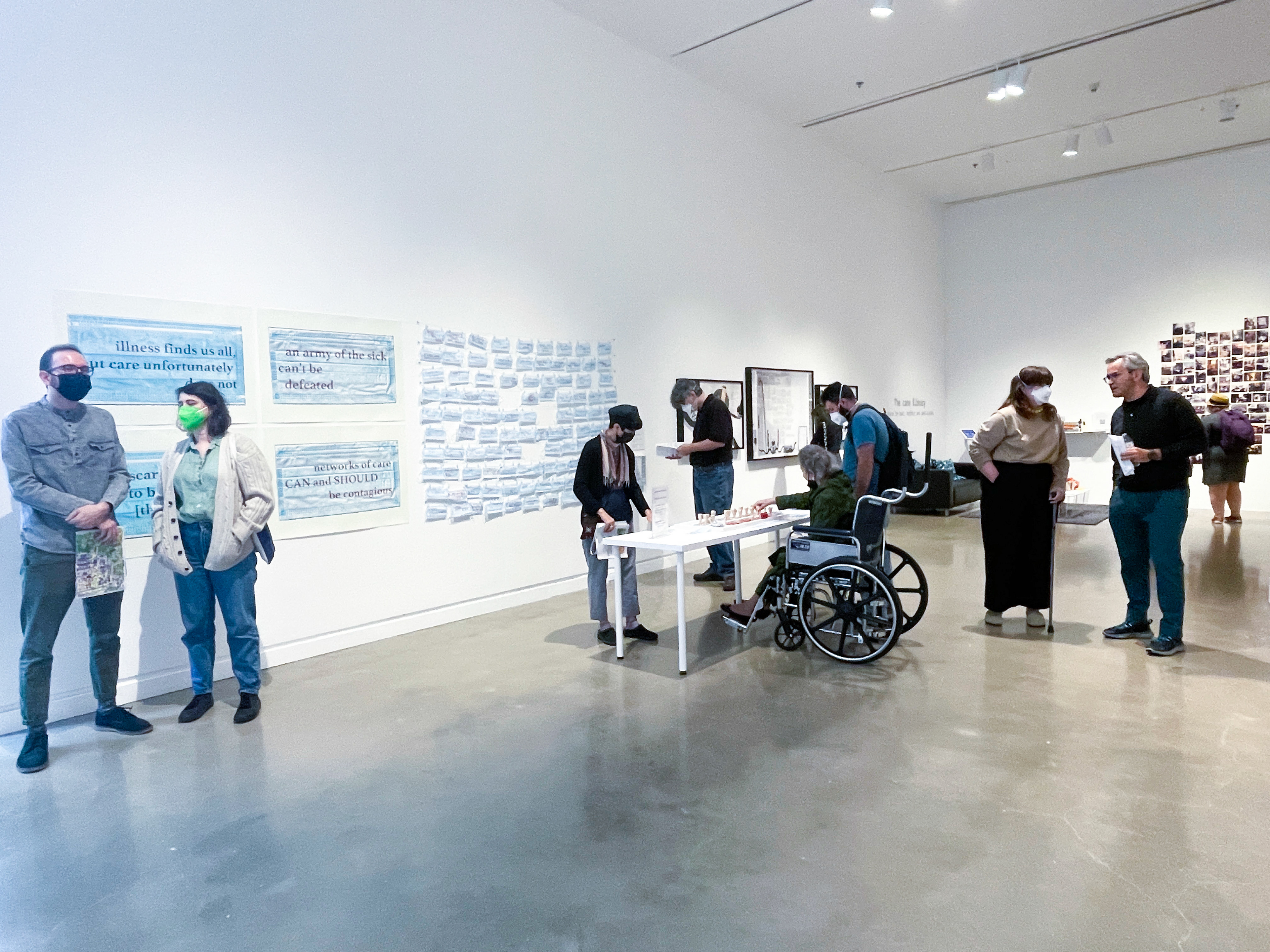



Press
Alicia Eler, Critics' picks: The 14 best things to do and see in the Twin Cities this week. Critics' picks for entertainment in the week ahead. Startribune. Published online on September 12, 2023
John Molseed, Mayo Clinic doctor calls for a health care revolution in his new book. In "Why we Revolt," Victor Montori wrote about how care has been lost in health care. Post Bulletin. Published online on September 11, 2023.
John Molseed, Minnesota artist's work conveys what life is like with a chronic illness. Artist Drew Maude-Griffin, who suffers from the chronic fatigue syndrome, tries to curate care and comfort with work that will be displayed at the Rochester Art Center. Post Bulletin. Published online on July 16, 2023.
John Molseed, What it looks like living with Multiple Sclerosis. Minnesota artist May Ling Kopecky makes art showing what it feels like to have her chronic illness. M.S. is called an “invisible illness” because its symptoms don’t always show for others to see. Post Bulletin. Published online on July 9, 2023.
Community Feedback
Programs:
In-person and virtual programming related to the exhibition are designed to build community and connect artists and healthcare professionals in order to build a stronger network across disciplines.
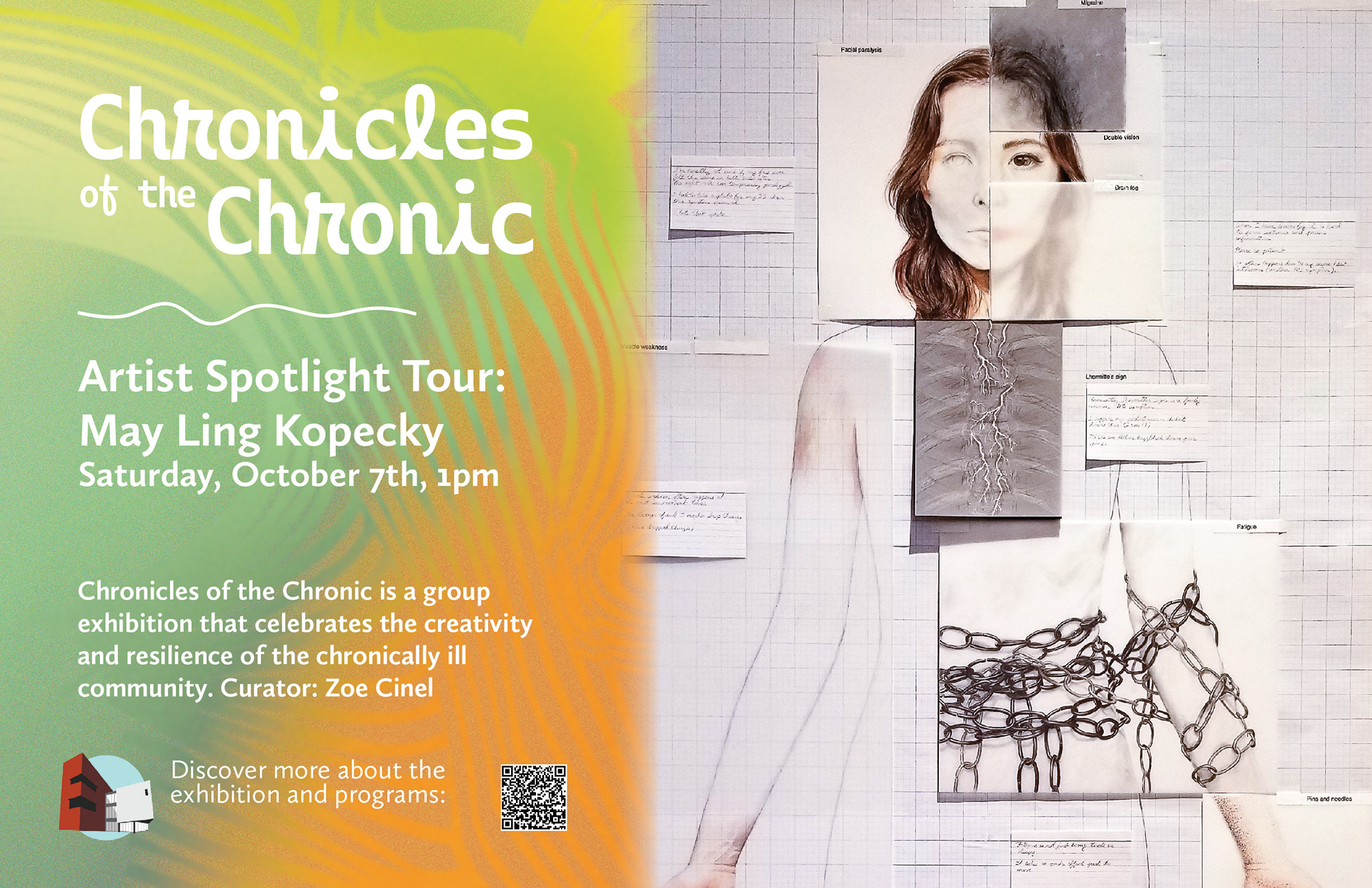
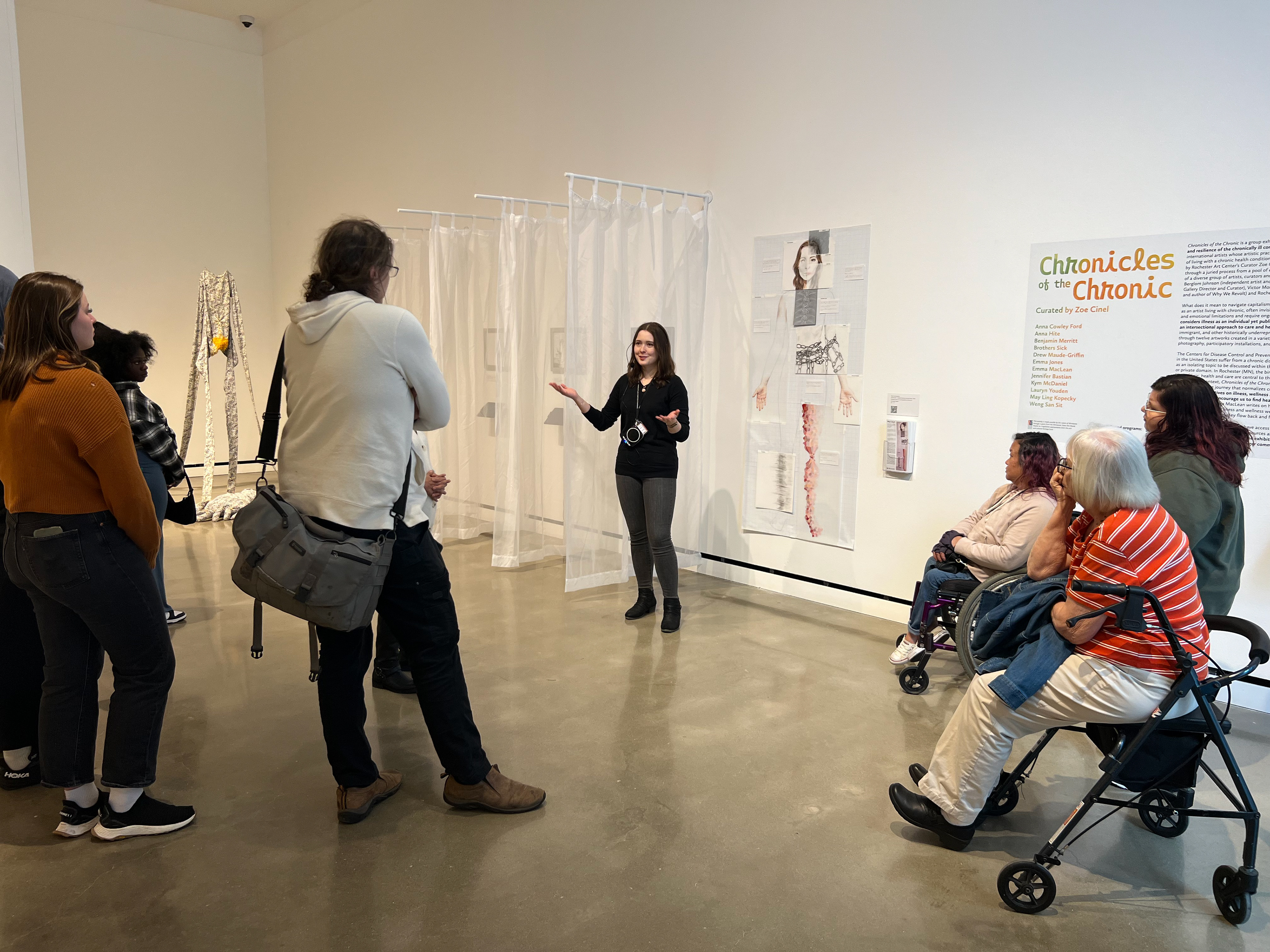
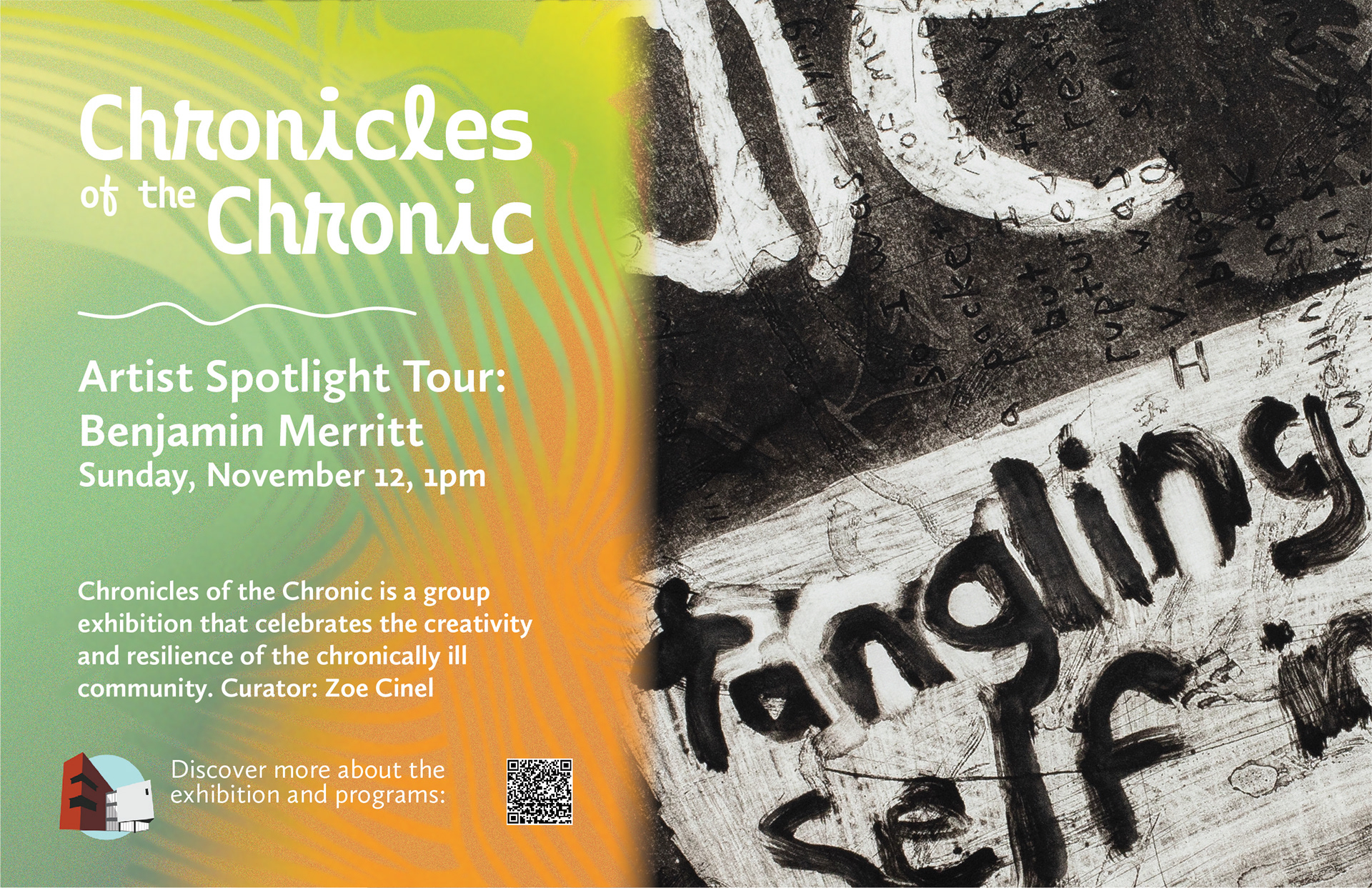
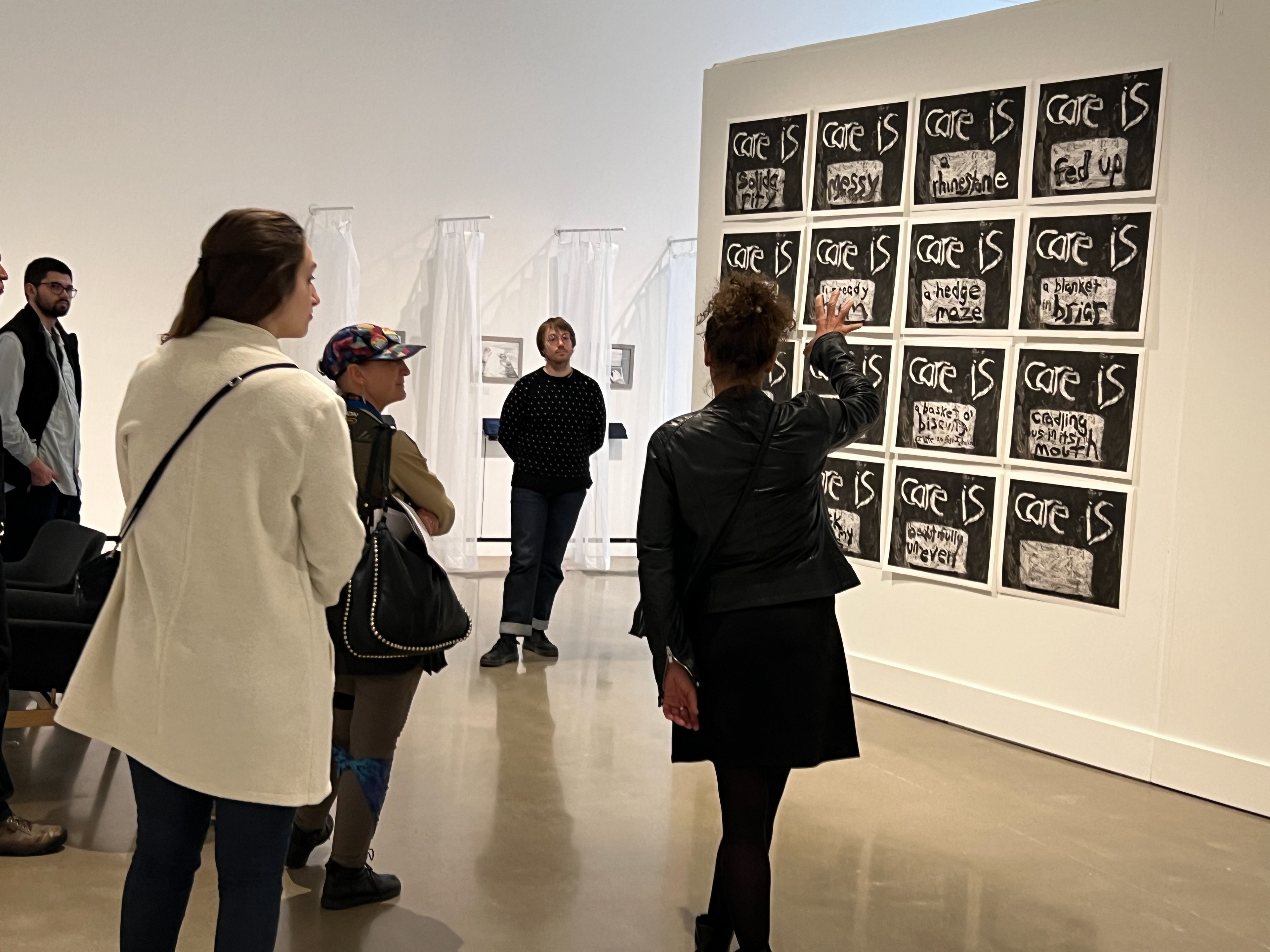
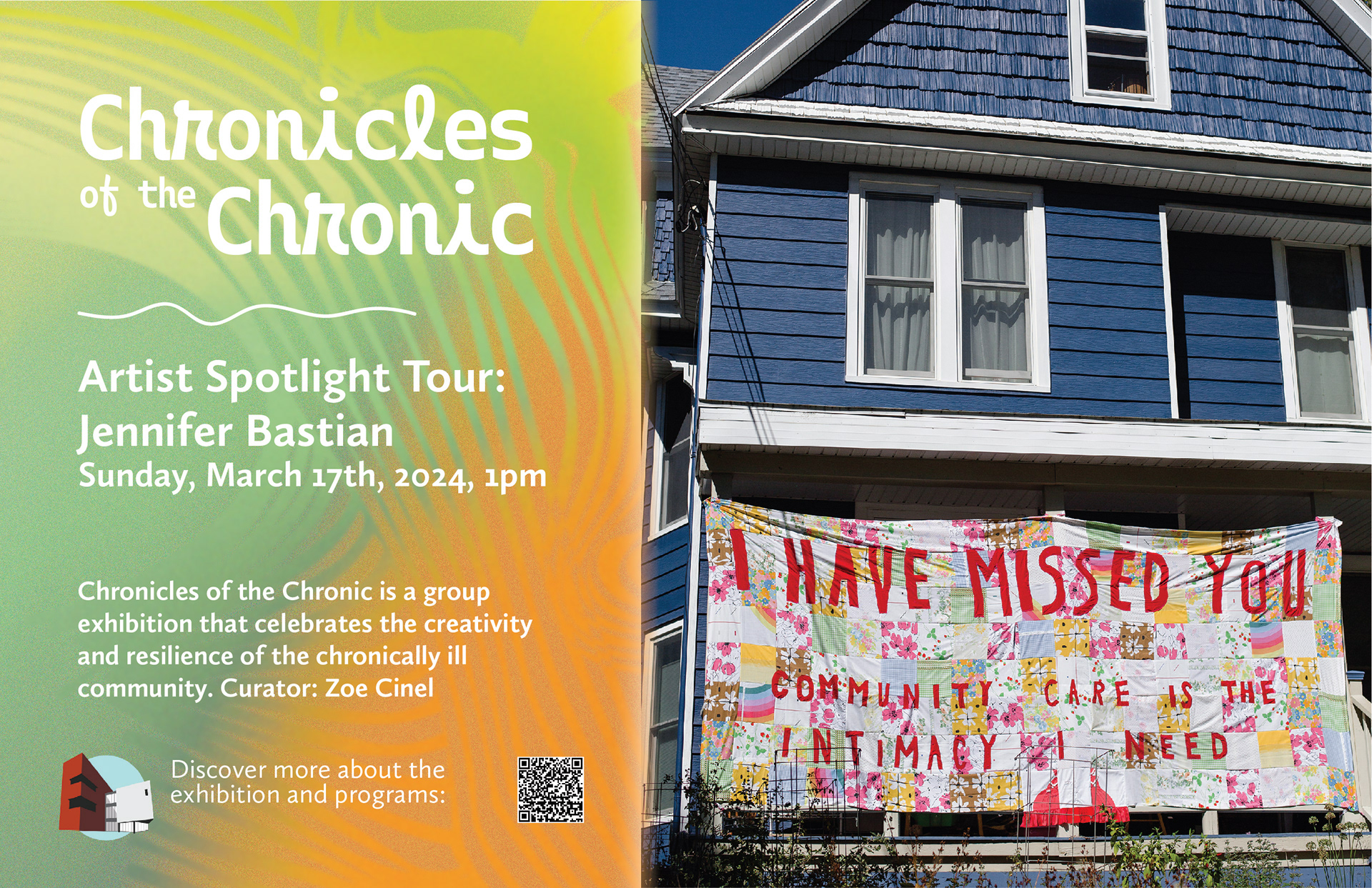

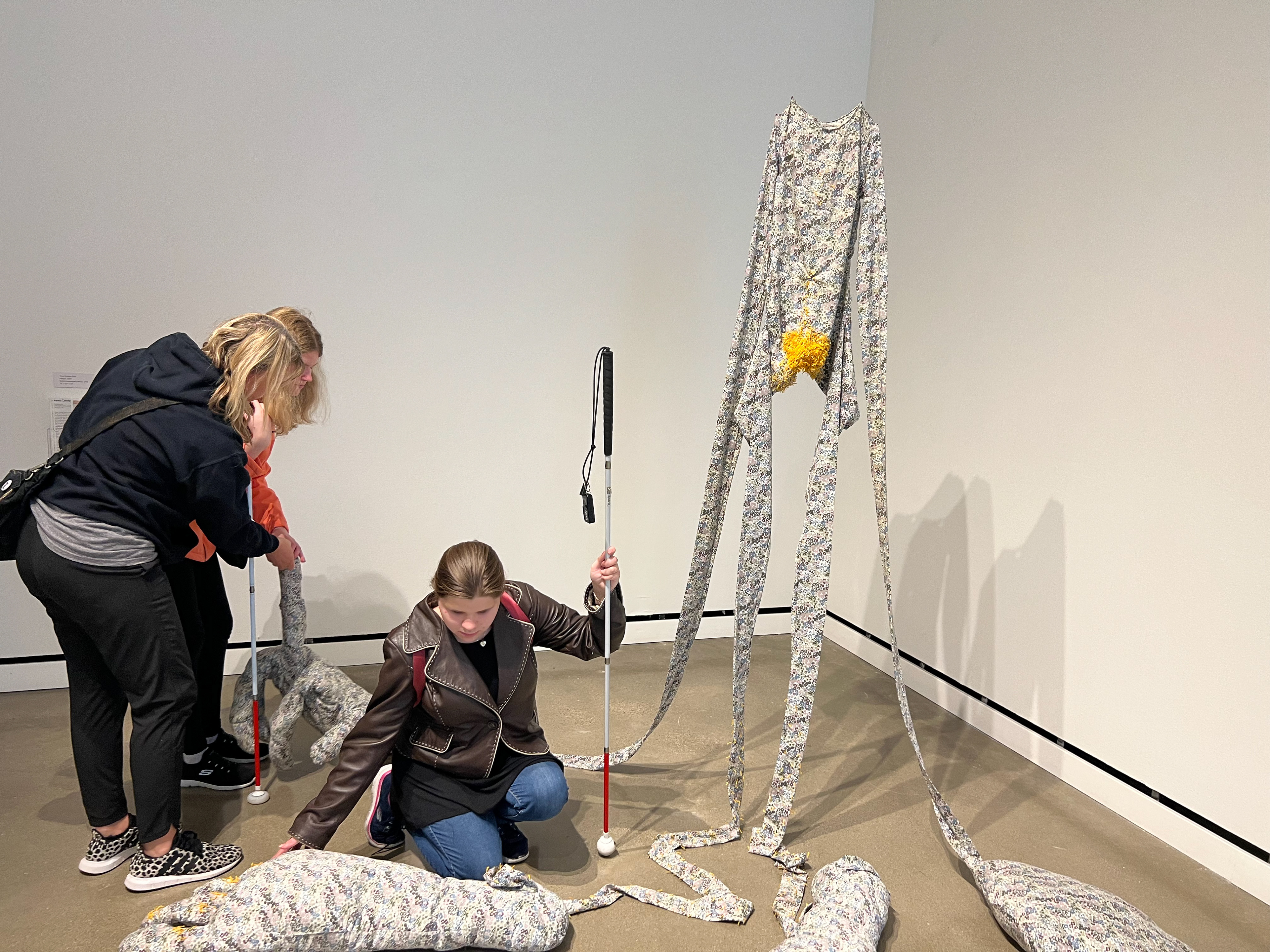
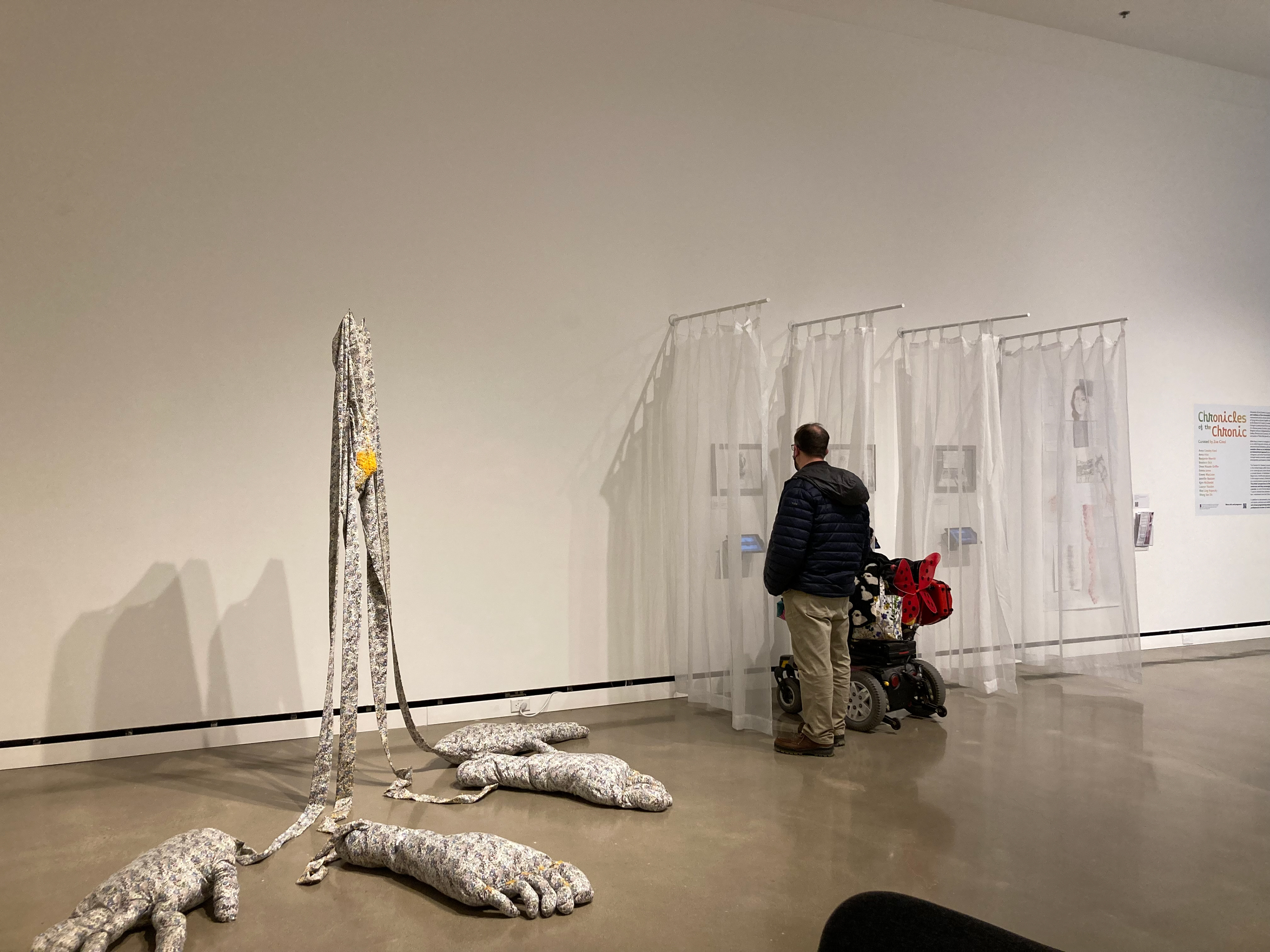
Virtual Panel Discussion with Anna Cowley Ford, Anna Hite and Kym McDaniel
Anna Cowley Ford (Portland, ME) uses a variety of media including soft sculpture, video, medical object, and ceramics, to communicate her personal experience with Chronic Migraines and pain, and to address larger issues of disability, mental health and chronic invisible illness.
Ford’s soft sculpture Fatigue is featured in Chronicles of the Chronic and was one of the first artworks that I considered to include in the exhibition. Very grateful to have your work in the show!
Anna Hite is an artist and educator in Mississippi. Though she was diagnosed with lupus at age 14, chronic illness and disability did not feature strongly in her work until the COVID-19 pandemic. Struck by the discussions around disability and disposability brought on by the pandemic, she was inspired to start exploring both personal and societal perceptions of disability in her work. Her installation, Recovery Position, was selected among a pool of over 100 artworks and 81 applicants by a jury of curators, artists and healthcare professionals. Congratulations and thank you for submitting your work.
Kym MacDaniel (Salt Lake City, UT) is an experimental filmmaker, choreographer and performer, who uses movement and gesture to explore the vulnerability of living in a sick and disabled body. She shifted from traditional dance performance to filmmaking after a head injury in her early 20s. Chronicles of the Chronic features McDaniels' video series Exit Strategies.
Artful Healing: Virtual workshop with Neuroscience Phd Student Morgan Fitzgerald
Sunday, January 28 | 10:00 AM, CST.
Click here to see the recording of the workshop
In this virtual workshop, neuroscience PhD student and host of the The Chronic Connection Podcast Morgan Fitzgerald will lead participants to explore the relationship between chronic pain and visual art, and to find a creative outlet to express and cope with their pain. In a supportive environment, individuals will share and process their experiences and perspectives through a short presentation, guided drawing exercises, and group sharing/discussion. This workshop engages with art as a means of transformative emotional processing and healing, with the ultimate goal to empower participants and strengthen a sense of community. About Morgan Fitzgerald: "As a neuroscience PhD student, emerging artist, and patient advocate, I am driven by the powerful intersection of art and advocacy. Living with chronic pain since the age of 12 has been an enduring and arduous journey. My profound struggle with chronic pain has shaped my perspective and fueled my passion for advocacy. By intertwining art, my personal experience, and my advocacy work, I strive to amplify the voices of those living with chronic pain, spark meaningful conversations, and drive positive change in healthcare and society." Fitzgerald is the founder and host of the The Chronic Connection Podcas, a series fo conversations dedicated to inspiring, empowering, and connecting women living with chronic illness. Tune in to hear how other women have discovered how to live well with their health challenges. Follow her on instagram at @lifewithmigraine
Delaney Liskey in conversation with May Ling Kopecky about Pediatric-Onset Multiple Sclerosis, patient experience and MS advocacy.
February 24, 2024 at 11:00 AM, CST.
Join us for a conversation with Regenerative Sciences Ph.D. Student at Mayo Clinic Graduate School of Biomedical Sciences, Delaney Liskey, and artist May Ling Kopecky, who is also the Learning Center Coordinator at Minneapolis College of Art and Design. Both Kopecky and Liskey were diagnosed with pediatric-onset multiple sclerosis (MS) at a young age. Through their distinctive practices, they each share the belief that patients have the most knowledge about their diseases, and should therefore be recognized as such.
At 11 years old, Delaney Liskey was diagnosed with pediatric-onset multiple sclerosis (MS) — a rare form of a commonly diagnosed disease. Today, as a graduate student in the inaugural class of the Regenerative Sciences PhD Track at the Mayo Clinic Graduate School of Biomedical Sciences, Lisdkey advocates for MS patients. Learn more about Liskey's research at Researching your own disease | Delaney Liskey | TEDxJacksonville: https://www.youtube.com/watch?v=QGLFTDziNGE
May Ling Kopecky is an artist based in Plymouth, Minnesota. She specializes in highly detailed, hyper-realistic drawings and paintings. "My work visualizes how I navigate the world with MS, focusing on my relationship with healthcare, the physical evidence of my symptoms in MRI scans, and how I and others perceive the world when struggling with MS symptoms. Using art as a means of communication, I spread MS awareness and advocate for people with invisible illnesses." Kopecky's work is featured in the exhibition Chronicles of the Chronic.
Routine and illness: A conversation about labor, care and structure with artist Weng San Sit, Hanna Barton PH.D., and Kasey Boehmer PH.D., M.P.H.
Wednesday, February 28th, 2024 at 6:30 - 7:45 PM, CST.
About the panelists:
Weng San Sit is a Singaporean Artist and educator currently based in Los Angeles. Utilizing primarily still and moving images, San’s work investigates the systems and power structures that create the dissonance between inattentive, homogeneous representations of marginalized bodies and the reality of complex and multi-faceted identities. San received a certificate from the International Center of Photography and an MFA from the California Institute of the Arts. She was a recent recipient of the Sundance Institute Uprise Grant and the Korea-Singapore Exchange Grant. Her work has been presented at the Angel Gate Cultural Center, Vincent Price Museum, USC Keck School of Medicine, City of Los Angeles Department of Cultural Affairs, International Center of Photography, Objectifs - Centre for Photography & Film among others.
San’s multimedia installation, Routine as Repertoire (2022-ongoing) is featured in Chronicles of the Chronic. In “Routine as Repertoire,” the mundane and tedious task of separating medication is reintroduced to us as a performance she habitually undertakes, much like any other routine we employ in our day to day lives. Illness becomes another aspect of living at the same time that it transforms an individual’s life, effectively disrupting our binary notions wellness vs illness.
Hanna Barton, PhD (they/them) is a human factors and health systems engineer with expertise in field research methods, health information technology (HIT) evaluation, and human-centered design. They envision and design systems of care that honor individuals’ unique life experiences to provide personalized care that addresses peoples’ real needs and desires. A significant contribution of their work thus far has been identifying and describing the home care environments and care work of caregivers, including the strategies caregivers develop to provide effective, safe care in their home. Currently, they are a Postdoctoral Research Associate in the BerbeeWalsh Department of Emergency Medicine at the University of Wisconsin - Madison. Rooted in Madison, WI, their passion for care permeates their relationship to their family and their community. Hanna will introduce Human Factors Engineering and Ergonomics—the study of work—as a framework for understanding how people care for themselves and others, i.e., patient and care work. They will discuss their research exploring strategies developed by caregivers of children with complex chronic illnesses as mechanisms for adapting care processes and devices to fit their unique goals.
Postdoctoral Research Associate | BerbeeWalsh Department of Emergency Medicine
Chair | HFES Macroergonomics Group
Co-Chair | HFES LGBTQ+ Affinity Group
Fellow | The Patient Revolution
Kasey Boehmer, PhD, MPH, NBC-HWC is an Assistant Professor of Health Services Research and National Board-Certified Health and Wellness Coach. She is a faculty member in the Mayo Clinic Division of Nephrology and Hypertension and the Division of Health Care Delivery Research. She also serves as a health services researcher in the Knowledge and Evaluation Research (KER) Unit and the Rural Health core in the Center for Clinical and Translational Sciences at Mayo Clinic. She directs the Minimally Disruptive Medicine Program of work at Mayo, and her primary research interests include patient-centered care and communication techniques to understand and support the capacity of patients with multiple chronic conditions and their caregivers. She has currently authored or co-authored over 40 publications on this topic, including a systematic review and thematic synthesis to develop a Theory of Patient Capacity. Furthermore, she has developed the ICAN Discussion Aid, a practical communication tool that supports the practice of MDM, to assist patients, their caregivers, and their healthcare teams with discussions about how life and healthcare are working together. This Discussion Aid also supports a practice called “Capacity Coaching” developed by Dr. Boehmer and her collaborators. Dr. Boehmer also grounds her work in her experience of living with six chronic conditions herself and in her interactions with fellow patients.
Virtual reading and artists talk with Lauryn Youden
Saturday, March 9th, 2024 at 11:00 AM CST.
Lauryn Youden will read live on zoom from her original text The More I Listen To My Body, The More I Hear It Screaming. The reading will be followed by a conversation with Curator Zoe Cinel and a Q&A with the audience.
About the reading:
The More I Listen To My Body, The More I Hear It Screaming was written the winter Lauryn Youden went through the final processes of receiving her diagnosis of fibromyalgia. It is an auto-theoretical text depicting her experiences during this process and examining the socio-cultural surroundings of receiving a diagnosis and having fibromyalgia. Informed by Susan Sontag’s Illness as Metaphor and AIDS and its Metaphor as well as by the Crip meme community on Instagram, the text includes a stream-of-consciousness listing of her desires, fears, and others' ableist biases and ignorances—beginning with «I don’t ask for help because….,» explaining with each sentence how a space for support, help, and care can be inaccessible due to ableism, capitalism, and misogyny. Also included in this text is an exploration of one of fibromyalgia’s claimed causes, childhood trauma, and the Iavnana, a Georgian pagan lullaby for sick children. This text includes two versions of the Iavana, to be played at the beginning and end of each reading.
About the artist:
Lauryn Youden (b. 1989, Canada) is a poet, performance and installation artist based in Berlin, Germany. Her practice derives from her research in and navigation through the medical industrial complex / colonial medicine, ‘alternative’ healing practices and traditional medicine for the treatment of her chronic illnesses and disabilities. By publicly presenting her personal experiences and re-evaluations of history, her work illuminates and advocates for repressed, marginalized and forgotten forms of radical care and Crip knowledge. In 2016 Youden was awarded the Berlin Art Prize. She has since been awarded residences at the Künstlerhaus Bethanien, Berlin (DE) in 2020, Rupert, Vilnius (LT) in 2021 and Wysing Arts Centre, Cambridge (UK) with Sickness Affinity Group SAG) in 2021. She has performed and exhibited internationally at institutions including (selection): Stedelijk Museum, Amsterdam (NL), Museion Bolzano (IT), Tabakalera, San Sebastian (ES), Aargauer Kunsthaus, Aarau (CH), Frye Art Museum, Seattle (US), Laumeier Sculpture Park, St. Louis (USA), 11th Berlin Biennale, Berlin (DE), Manifesta 12, Palermo (IT), Shedhalle, Zurich (CH), Württembergischer Kunstverein, Stuttgart (DE), Volksbühne, Berlin (DE), Musik Installationen Nürnberg (DE) and Künstlerhaus Bethanien, Berlin (DE). This year her works are included in exhibitions and events at Migros Museum, Zurich (CH), Open Forum, Berlin (DE), E-WERK Luckenwalde (DE), Kunsthalle Zurich (CH) and Pogo Bar – KW Institute for Contemporary Art, Berlin (DE).